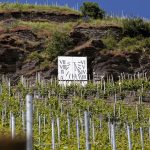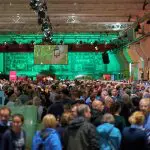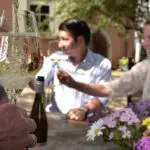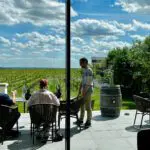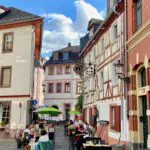If you are a wine lover planning to visit the Mosel wine region, this guide is for you. The Mosel Valley not only offers great wines – it has plenty to offer in terms of culture, history, and scenery. Our BottleStops Mosel wine tour guide covers: the best time to travel, the main Mosel wine areas, suggestions on transport, some wineries that stand out, basic tips for accommodation and restaurants, dos-and-don’ts when visiting wineries. With that you are perfectly well equipped to explore the Mosel wine region on your own with a self-guided tour (if you prefer a fully guided Mosel wine tour, we at BottleStops are at your service). Note this was written totally AI free – just sharing our personal wine an travel wisdom :-).
What is the best time to travel Mosel?
Simply spoken, the Mosel wine region is beautiful at any time of the year. However: the area tends to get very busy during summer holidays in July and August, and fairly busy during harvest in September and October – and extremely quiet in November, January, and February (with many businesses simply taking their annual breaks). With that we’d recommend March to June for travel, alternatively early autumn.
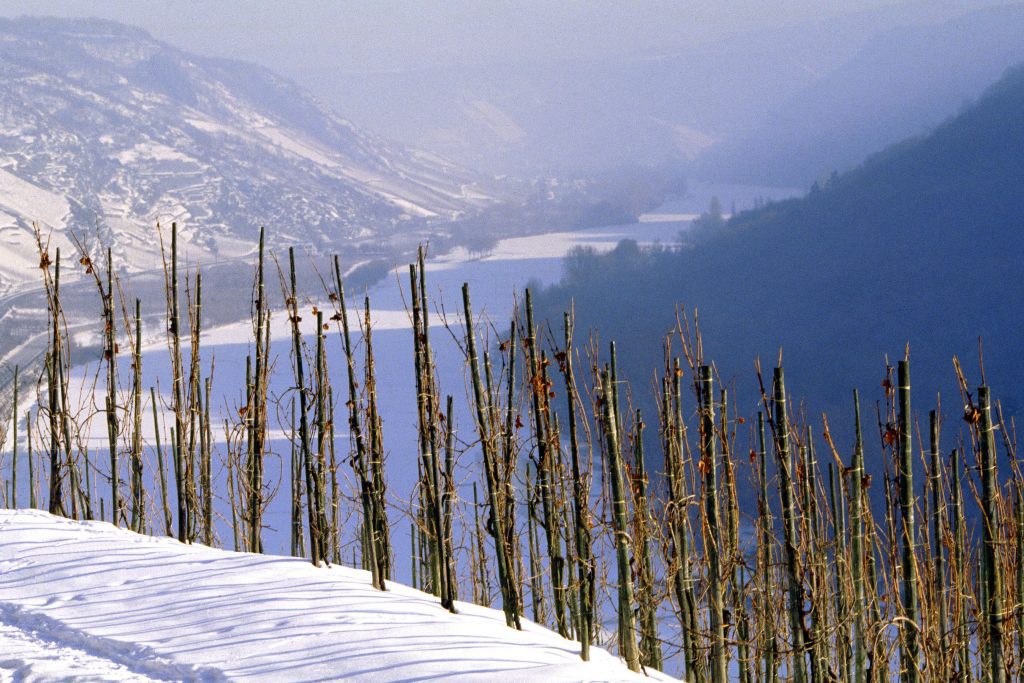
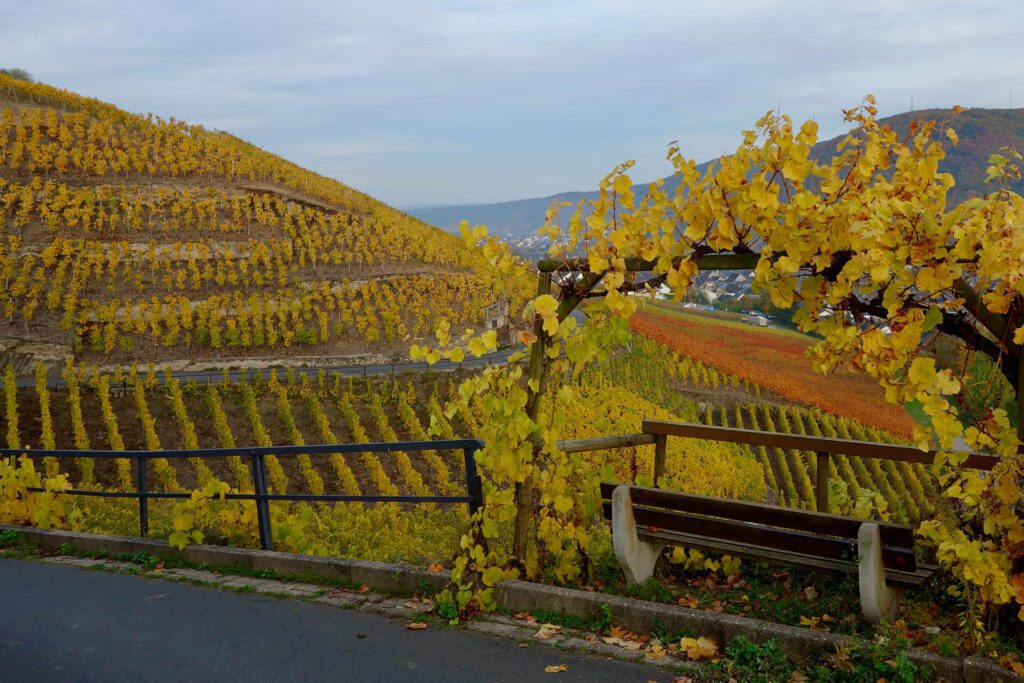
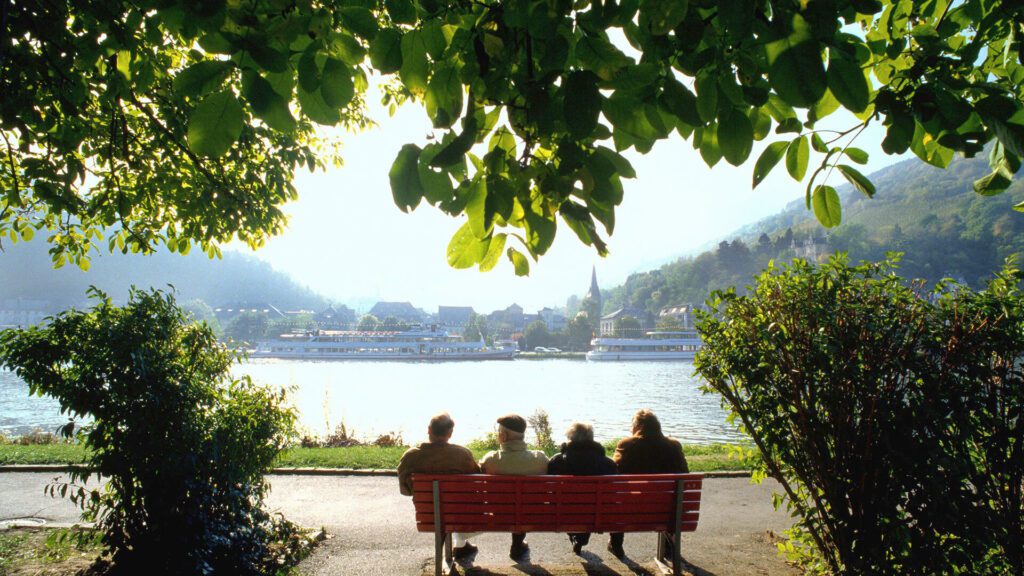
Be aware of bank and religious holidays, as many wineries will be taking these days off: For sure the period between Christmas and New Year should be blanked out from your travel plans.
And last but not least: see if you can match your travel dates so some of the Mosel wine festivals
- First Weekend in April 2024 – Via Mosel Open Doors with a plethora of Wineries opening their doors for visitors.
- End of May 2024 – Mythos Mosel, a spectacular tasting event taking place near Bernkastel Kues
- End of August 2024 – Saar Riesling Sommer, a tasting event with focus on the Saar subregion of Mosel
For more information on Wine Festivals in Germany and Wine Tasting events, refer to our recent blog posts: Must-attend Wine Events in Germany 2024 for Wine Lovers
The Mosel wine areas – where to stay
On a trip through Germany, Koblenz and Bernkastel are the best towns to stay to explore Mosel (if you have limited time or if you are travelling through Frankfurt, we’d recommend a day trip from Mainz – check out our map ). The Mosel River meanders over 200 kilometers from France and Luxembourg to Koblenz in Germany, where it meets the Rhein River. Grapes are grown at almost all stretches of the steep riverbanks (it is estimated that 60 million vines are planted in Mosel!). The mountainous terrain, the remote region and the winding small roads require good itinerary planning.
There are three areas in the Mosel valley, each is best accessed from a particular city: the Ober-Mosel region in the west, best accessed from the historic city of Trier – from here you can also access the Mosel tributary river valleys Saar and Ruwer. However, Trier tends to be slightly isolated from the rest of Germany. Further downstream we find the Middle Mosel (in the middle), which is best accessed from historic wine town Bernkastel-Kues; and final stretch reaching into the Rhein river is called the Terassenmosel which you may want to explore coming from from the city of Koblenz.
Wineries to visit in Mosel
This is a list of wineries to visit as if you were travelling downriver from Trier downriver and stop right and left. This list is far from comprehensive, and we picked a couple wineries we particularly like – however, this is a just minute selection from hundreds of excellent estates worth a visit and a sip.
As almost always in German wine regions, it is advisable to call for a tasting appointment (…and a must to avoid disappointments with small estates). If you do not plan on buying wines by the case, agree on a tasting fee in advance of your visit.
Vereinigte Hospitien in Trier: taste wines from a cellar dating back to Roman times, Germany’s oldest wine cellar.
Weingut Rinke in Mertestdorf: as newcomer this couple-run estate features a Mosel-untypical focus on Pinots and Chardonnays
Karthäuser Hof: despite being one Germany’s oldest wine estates in operation Karthäuser Hof offers a progressive line of natural wines.
Weingut Julian Haart in Piesport: shooting star Julian Haart operates a micro-estate in Piesport – if you can’t score a tasting, see that you pick up a bottle or two of his unbelievably fresh and lively Rieslings.
Weingut Pauly in Lieser: a small family estate located on a hilltop – Axel Pauly produces extremely focused and clean Rieslings, and recently added excellent Pinot Noirs to his list as well.
Weingut Dr Loosen in Bernkastel: Mosel superstar Ernst Loosen was one of the first to put German Rieslings back on the international wine menus in the early 2000’s
Weingut Selbach-Oster in Zeltingen: Family Selbach’s Mosel Rieslings have made their way into some of the best restaurants in the US.
Weingut Franzen in Bremm: the young winemaker couple Franzen work one of the world’s steepest vineyards, the Bremmer Calmont
Weingut Lubentiushof in Mertesdorf: a micro-winery with autodidact Andreas Barth creating non-conventional Rieslings with least possible intervention.
Weingut Heymann Löwenstein in Winningen: for decades Löwenstein produces terroir driven Rieslings from the terraced vineyards of the lower Mosel.
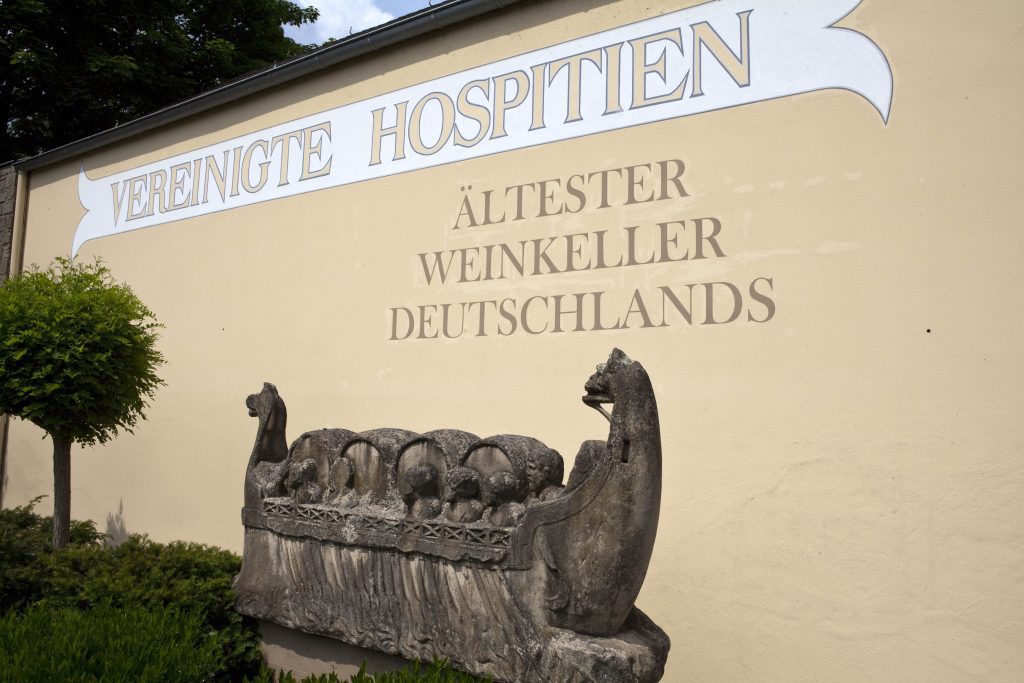
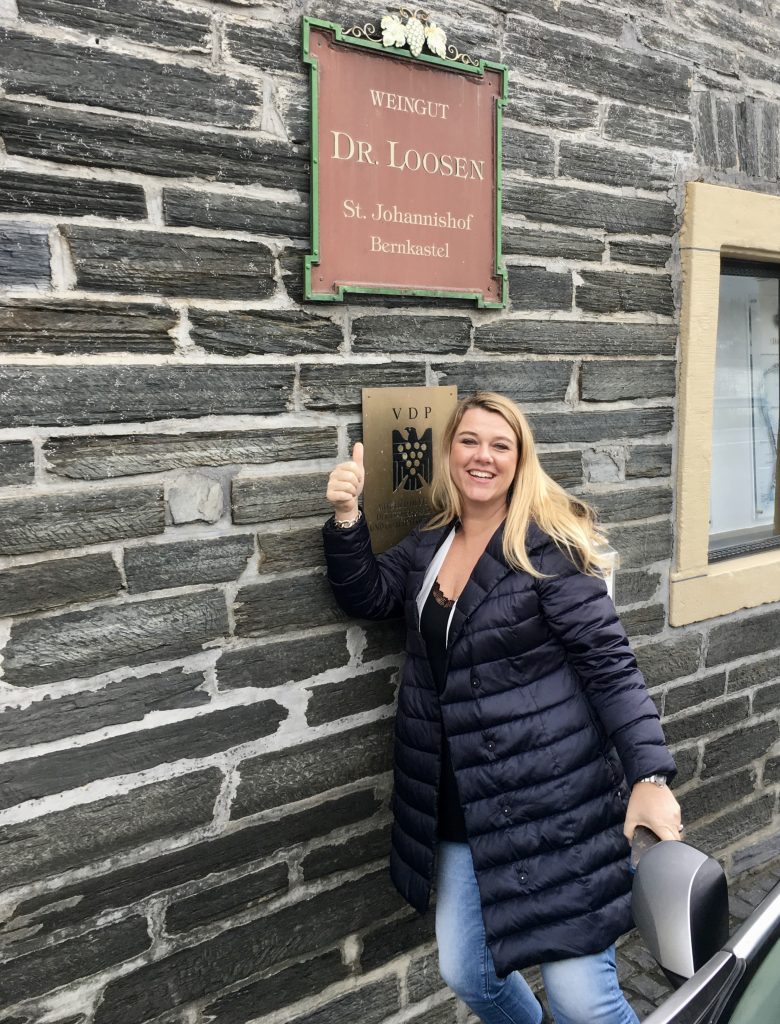
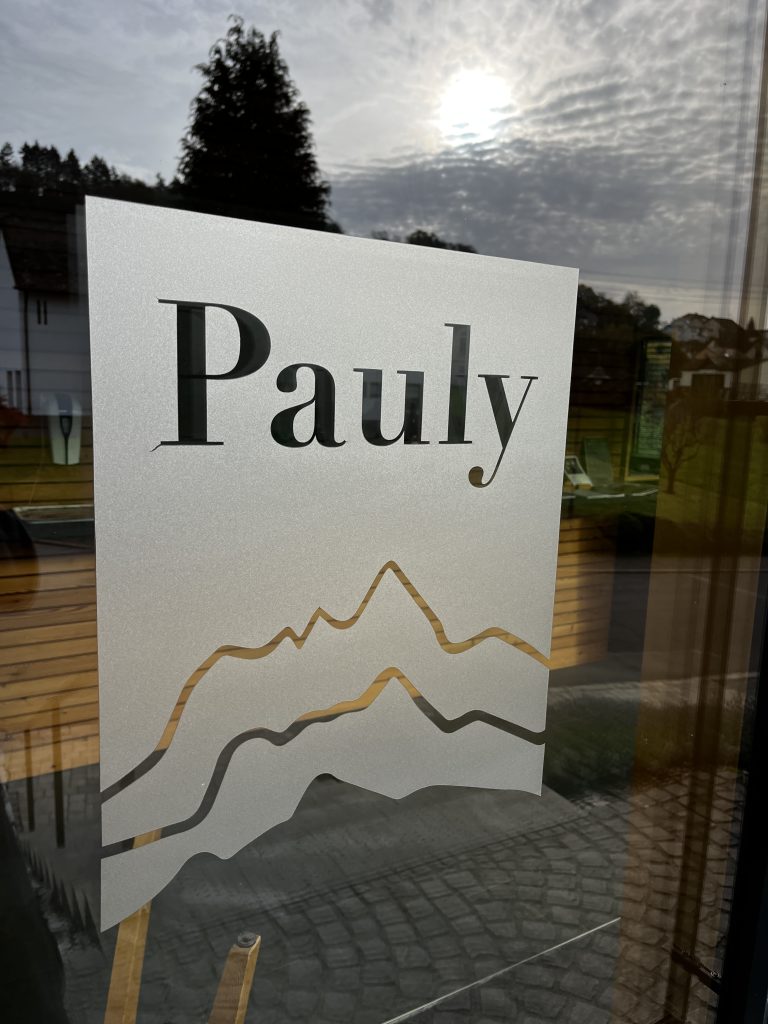
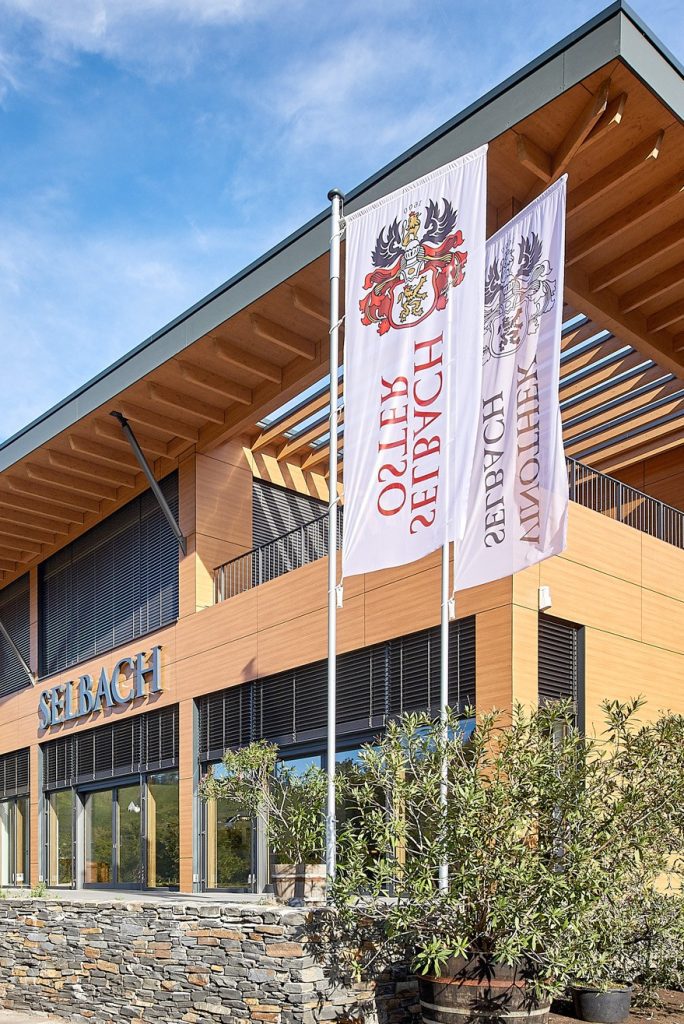
Getting around the Mosel River Valley
If you want to explore both, vineyards and wineries on a wine tour in Mosel, there is no way around travelling by car. Consider about 5-6 days if you want to explore the entire Mosel area, or at least a full day each for one of the river sections, count a tasting each in the morning and in the afternoon to keep pace leisurely and allow for taking in views (and a meal or two). Particularly in high season, patience will be required as many of the historic townships are dealing with congestion and a lack of parking. If you find time, swap the car for a bike, and take a scenic ride along the well protected cycling paths, or hop on one of the relaxing day-cruises from Bernkastel-Kues.
Wine-lover recommended accommodation in the Mosel area
As a touristic destination the Mosel region features a plethora of nice places to stay – we thus recommend just some we know are particularly popular with travelling wine lovers.
Obermosel in and around Trier
- Hotel Villa Hügel in Trier – a former wine-traders house with sweeping Mosel views
Mittelmosel:
- Schloss Lieser in Bernkastel Kues for ultimate luxury
- Zeltinger Hof in Zeltingen-Rachtig, for homey comfort and an exceptional wine cellar
- Das Wohlgemuth Heim, for a boutique ‘bed & wine’
- Staffelter Hof, for a historic winery and guesthouse
Terassenmosel:
- Alte Mühle Höreth near Kobern-Gondorf for a historic setting
- Altstadthotel in Koblenz old town for more ‘city’ when exploring Mosel
Wine lover recommended restaurants in the Mosel Region
Same as with accommodation, there is no lack of good restaurants in the Mosel region. Using the nifty Michelin guide online to find great places to dine comes in handy, however, we picked a handful of restaurants that are amongst the favorites of the experienced Mosel wine travelers.
Obermosel in and around Trier
- ‘Das Weinhaus’ for one of the most extensive winelists in the region
- ‘Oechsle’ for the best place to have wine and fish in the heart of Trier
Mittelmosel:
- Family operated ‚Das Schanz‘ for a star rated dining experience in Piesport
- Reiler Hof in Reil – for modern style German dishes
Terassenmosel:
- ‘Landhaus Haferschenke’ in Dieblichfor offering countryside tavern meals on a high-end
- ‘Gerhards Genussgesellschaft’ – fine dining in a historic location right at the confluence of Rhine and Mosel
Things to eat – here is some classic Mosel food to look out for:
Fish lovers should ask for trout, eel (typically smoked), or pikeperch. Lokals will have it with a side of tasty ‘Gräves’, a blend of potato mash and sauerkraut.
If meat is your thing, go for game. Wild boar, deer, venison – all versions of big game is on the menue. Preparations include proper cuts, grilled or braised, but also sausages and burgers. Most vintners have hunting licenses… and if you find local game tastes like Riesling, it’s the vintners’ way to recuperate some of their grapes. Want a sauce with your meat? We recommend authentic mustard from Cochem – artisan production since 1810.
You enjoy potatoes? ‘Schorles’, ‘Schaales’, ‘Döppelabbes’ or ‘Döppekooche’, are all different names for the local version of a hearty potato gratin with a gorgeous crust – often served with a generous side of applesauce.
Finish your meal with a desert from red vineyard peaches (‘Weinbergpfirsich’). Yes peaches! From vineyard sites in the Mosel region. This special varietal of peach is comparatively small, features a firm red flesh of intense and tart flavor. Mosel red vineyard peaches are typically processed to jams, compotes, jellies, and liqueurs.
Fancy a digestif? Distillery Vallendar produces some of the best ‘schnaps’ in Germany. Try their German version of Grappa distilled from grape skins, or the impossibly intense hazelnut brandy.
Practical tips to plan your wine tour
Last but not least before you leave on your wine trip – a couple of does and don’ts for your wine tastings in Mosel
- Make appointments with the wineries you want to visit
- Be on time, many wineries work with very little staff and will schedule their work
- Small wineries take valuable time to show you their wines – unless you purchase a couple of cases pay for your tastings
- Don’t underestimate time to travel between locations, roads are small, and in season traffic can get dense
- Never drink and drive! Book a taxi, or have a designated driver.
- Consider booking a tour with BottleStops your wine tour experts.
- Read up on Mosel wine history and culture – see if you can spot some of the travel highlights mentioned in our Mosel trivia blog.

